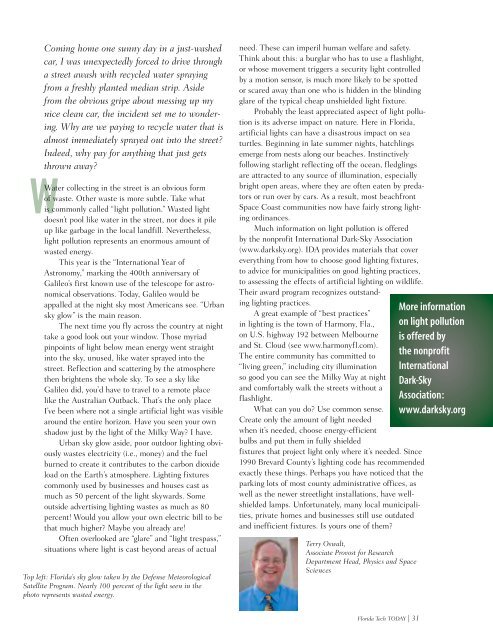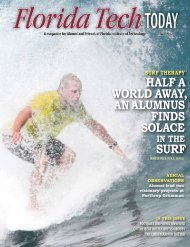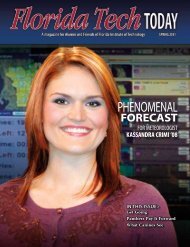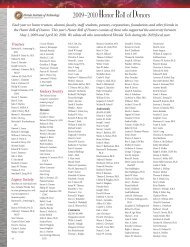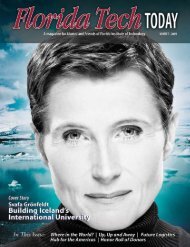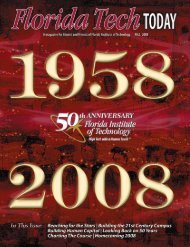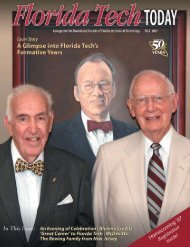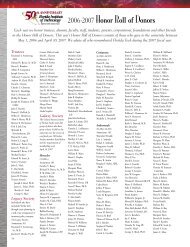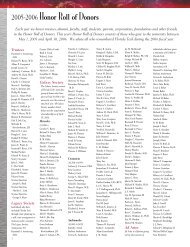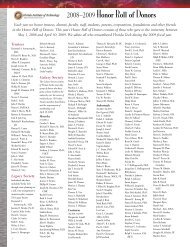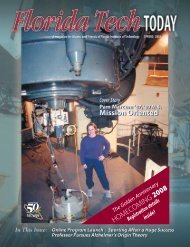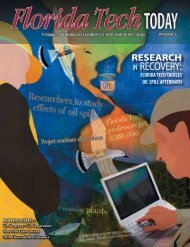Fall 2009 - Florida Tech Today - Florida Institute of Technology
Fall 2009 - Florida Tech Today - Florida Institute of Technology
Fall 2009 - Florida Tech Today - Florida Institute of Technology
Create successful ePaper yourself
Turn your PDF publications into a flip-book with our unique Google optimized e-Paper software.
Coming home one sunny day in a just-washed<br />
car, I was unexpectedly forced to drive through<br />
a street awash with recycled water spraying<br />
from a freshly planted median strip. Aside<br />
from the obvious gripe about messing up my<br />
nice clean car, the incident set me to wondering.<br />
Why are we paying to recycle water that is<br />
almost immediately sprayed out into the street?<br />
Indeed, why pay for anything that just gets<br />
thrown away?<br />
Water collecting in the street is an obvious form<br />
<strong>of</strong> waste. Other waste is more subtle. Take what<br />
is commonly called “light pollution.” Wasted light<br />
doesn’t pool like water in the street, nor does it pile<br />
up like garbage in the local landfill. Nevertheless,<br />
light pollution represents an enormous amount <strong>of</strong><br />
wasted energy.<br />
This year is the “International Year <strong>of</strong><br />
Astronomy,” marking the 400th anniversary <strong>of</strong><br />
Galileo’s first known use <strong>of</strong> the telescope for astronomical<br />
observations. <strong>Today</strong>, Galileo would be<br />
appalled at the night sky most Americans see. “Urban<br />
sky glow” is the main reason.<br />
The next time you fly across the country at night<br />
take a good look out your window. Those myriad<br />
pinpoints <strong>of</strong> light below mean energy went straight<br />
into the sky, unused, like water sprayed into the<br />
street. Reflection and scattering by the atmosphere<br />
then brightens the whole sky. To see a sky like<br />
Galileo did, you’d have to travel to a remote place<br />
like the Australian Outback. That’s the only place<br />
I’ve been where not a single artificial light was visible<br />
around the entire horizon. Have you seen your own<br />
shadow just by the light <strong>of</strong> the Milky Way? I have.<br />
Urban sky glow aside, poor outdoor lighting obviously<br />
wastes electricity (i.e., money) and the fuel<br />
burned to create it contributes to the carbon dioxide<br />
load on the Earth’s atmosphere. Lighting fixtures<br />
commonly used by businesses and houses cast as<br />
much as 50 percent <strong>of</strong> the light skywards. Some<br />
outside advertising lighting wastes as much as 80<br />
percent! Would you allow your own electric bill to be<br />
that much higher? Maybe you already are!<br />
Often overlooked are “glare” and “light trespass,”<br />
situations where light is cast beyond areas <strong>of</strong> actual<br />
Top left: <strong>Florida</strong>’s sky glow taken by the Defense Meteorological<br />
Satellite Program. Nearly 100 percent <strong>of</strong> the light seen in the<br />
photo represents wasted energy.<br />
need. These can imperil human welfare and safety.<br />
Think about this: a burglar who has to use a flashlight,<br />
or whose movement triggers a security light controlled<br />
by a motion sensor, is much more likely to be spotted<br />
or scared away than one who is hidden in the blinding<br />
glare <strong>of</strong> the typical cheap unshielded light fixture.<br />
Probably the least appreciated aspect <strong>of</strong> light pollution<br />
is its adverse impact on nature. Here in <strong>Florida</strong>,<br />
artificial lights can have a disastrous impact on sea<br />
turtles. Beginning in late summer nights, hatchlings<br />
emerge from nests along our beaches. Instinctively<br />
following starlight reflecting <strong>of</strong>f the ocean, fledglings<br />
are attracted to any source <strong>of</strong> illumination, especially<br />
bright open areas, where they are <strong>of</strong>ten eaten by predators<br />
or run over by cars. As a result, most beachfront<br />
Space Coast communities now have fairly strong lighting<br />
ordinances.<br />
Much information on light pollution is <strong>of</strong>fered<br />
by the nonpr<strong>of</strong>it International Dark-Sky Association<br />
(www.darksky.org). IDA provides materials that cover<br />
everything from how to choose good lighting fixtures,<br />
to advice for municipalities on good lighting practices,<br />
to assessing the effects <strong>of</strong> artificial lighting on wildlife.<br />
Their award program recognizes outstand-<br />
ing lighting practices.<br />
A great example <strong>of</strong> “best practices”<br />
in lighting is the town <strong>of</strong> Harmony, Fla.,<br />
on U.S. highway 192 between Melbourne<br />
and St. Cloud (see www.harmonyfl.com).<br />
The entire community has committed to<br />
“living green,” including city illumination<br />
so good you can see the Milky Way at night<br />
and comfortably walk the streets without a<br />
flashlight.<br />
What can you do? Use common sense.<br />
Create only the amount <strong>of</strong> light needed<br />
when it’s needed, choose energy-efficient<br />
bulbs and put them in fully shielded<br />
fixtures that project light only where it’s needed. Since<br />
1990 Brevard County’s lighting code has recommended<br />
exactly these things. Perhaps you have noticed that the<br />
parking lots <strong>of</strong> most county administrative <strong>of</strong>fices, as<br />
well as the newer streetlight installations, have wellshielded<br />
lamps. Unfortunately, many local municipalities,<br />
private homes and businesses still use outdated<br />
and inefficient fixtures. Is yours one <strong>of</strong> them?<br />
Terry Oswalt,<br />
Associate Provost for Research<br />
Department Head, Physics and Space<br />
Sciences<br />
<strong>Florida</strong> <strong>Tech</strong> TODAY | 31<br />
more information<br />
on light pollution<br />
is <strong>of</strong>fered by<br />
the nonpr<strong>of</strong>it<br />
international<br />
Dark-sky<br />
Association:<br />
www.darksky.org


